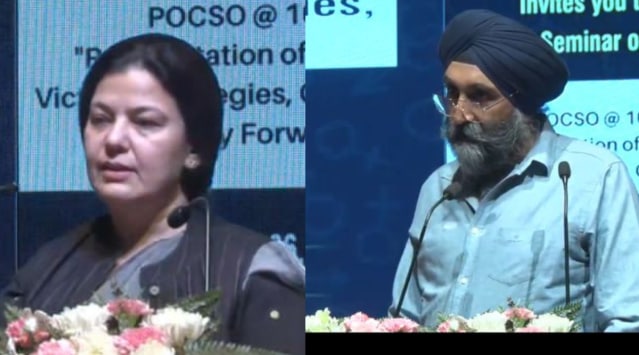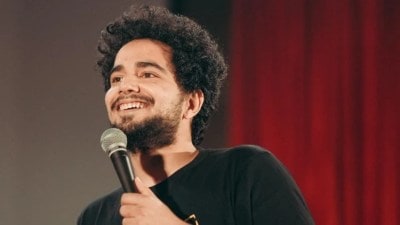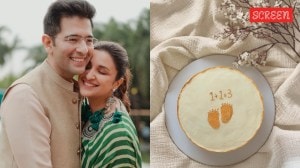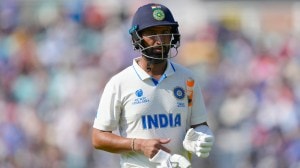Call them survivors, look into over-criminalisation of adolescent love: Delhi HC judges at POCSO seminar
Justice Ganju was speaking as the Chief Guest at the opening session of a seminar organised by the Delhi Commission for Protection of Child Rights (DCPCR) titled “POCSO @10: Rehabilitation of POCSO Victims: Strategies, Challenges and way forward”.
 Delhi High Court judge Justice Tara Vitasta Ganju (left) ; Justice Jasmeet Singh (right)
Delhi High Court judge Justice Tara Vitasta Ganju (left) ; Justice Jasmeet Singh (right) Delhi High Court judge Justice Tara Vitasta Ganju on Saturday emphasised on the need to address children who have been sexually abused as survivors and not victims, as the term has negative connotations.
Justice Ganju was speaking as the Chief Guest at the opening session of a seminar organised by the Delhi Commission for Protection of Child Rights (DCPCR) titled “POCSO @10: Rehabilitation of POCSO Victims: Strategies, Challenges and way forward”.
“I found that this is a word which has completely negative connotations…just the fact that continuously we are calling them a victim…Instead of victim we may use the word survivor…because what has happened has happened. They don’t need to keep being reminded of the fact that they are a victim,” Justice Ganju said.
She further said that law and courts are not “static” and that judges have been constantly passing judgments on this issue, but a lot more needs to be done.
She said that the “process of healing is much longer for children” and they require intervention at every step.
“Whether it is restorative care in the medical and health care system, whether it is understanding of the education, familial and paralegal needs of the children. We can’t repair or reverse the trauma caused but we do need to aid the child, through their life, at least until they achieve a certain age. There should be a way of looking at how they are dealing with it… There is a lot of awareness, dissemination of information, formulation of a child protection policy, to look at prevention not just cure, the support person to submit monthly reports, special financial relief in certain contingencies and various other changes such as a preliminary assessment form which needs to be filled up. That coupled with the new medico legal form will help to progress rights of any such child,” she said.
Noting that “trauma has a way of coming back” which makes rehabilitation of children important Justice Ganju said, “Question is what can each of us do, if you know anybody in your neighbourhood, if you come across someone please try and hep”.
She also highlighted that facilitative processes can be used by various agencies which work with rehabilitation who can sit together and come with suggestions and thoughts.
Justice Jasmeet Singh, who was the chief guest at the closing session, emphasised that the POCSO Act is not only “punitive” but also “assures affirmative action” as it provides for imprisonment which can extend to life but also “concentrates on granting compensation to the victim”.
He noted that usually in such matters when it comes to an end is when compensation is granted to the survivor which may derail the process “because rehabilitation or compensation is required not at the end of the process but sometimes in between or in the beginning”.
He also referred to an October 2022 decision of the HC in “X v State” which said that interim compensation needs to be paid at the time when chargesheet is filed and expressed that although it is a step forward it needs to be taken forward by “executing agencies”.
Speaking on “adolescent love” Justice Singh questioned, “Are we over criminalising adolescent love?” further explaining that adolescents are children who “are in a position or who want to experiment who would be sexually active”.
Giving an example where one child is 18 years and the other is 19 years, Justice Singh questioned, “can they be equated with the same brush or can they be equated in the same scenario where a victim is of 18 years and the offender is about 30 or 35 years?”
“Because there are cases where one child is 17 years old and the other is 20 years old. They have fallen in love. The law says consent of a minor is no consent. But I personally feel this is an issue which needs to be looked into and needs to be addressed, needs to be flagged,” he said.
He also spoke about how often in such cases the person who is the accused is either a family member or is a person who exercises control over the child. “This is an aspect which needs attention because the accused is more often than not in a position to groom the child. So that often results in acquittal, the witnesses become hostile, the trial takes a huge period of time. So, this is again one issue which needs to be addressed when we talk about rehabilitation,” Justice Singh said.
He further said that while the counsel for the accused has a “duty to perform and he has to be honest to his client”, his effort is to prove that the “survivor is either lying, is exaggerating the incident” and that results in “re traumatisation, reliving of the whole incident by the survivor”.
“This again is something which needs to be addressed because the criminal justice system requires the survivor to be cross examined… These are issues which are plaguing the system, I’m sure as we move forward things would be done in this direction,” Justice Singh said.
Observing that survivors need to be integrated back into the society he said, “We have interacted with them in chambers, what they actually are looking for is a voice. They want to be brought back into society. It needs to be told that yes you have been wronged; it must be recognised. It is something where the society, the family members need to be sensitised, need to be more aware of the issue that actually the child feels that they have been wronged,” he underscored.
He concluded by lauding the efforts of DCPCR calling them the “first line of rehabilitation process” and an “essential key in creating awareness”, and ensuring that such children get counselling.







